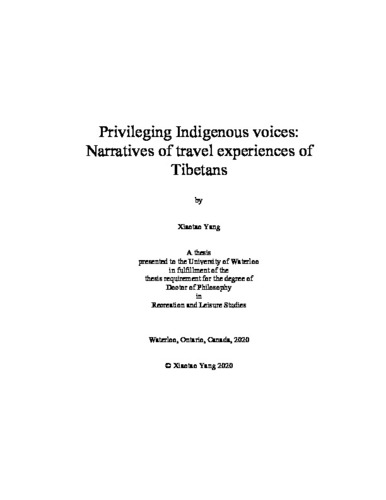| dc.description.abstract | In 2012, Peters and Higgins-Desbiolles, wrote “What is wholly absent [from the tourism literature] …is any recognition of Indigenous peoples as tourists” (p.78). Chambers and Buzinde (2015) acknowledged that “tourism knowledge is still predominantly colonial” (p.1). As a response to these claims, this study aims to privilege and center Tibetan peoples’ knowledge as tourists, rather than as objects for tourists to gaze upon. Specifically, three research questions have guided this study:
1. What travel and tourism-related issues do Tibetan participants consider important?
2. How do Tibetan travelers narrate their travel experiences?
3. How does the research contribute to building a critically-informed understanding of tourism issues relevant to Indigenous peoples (e.g., experience, knowledge)?
The first research question was purposely left open for the Tibetan participants, leaving room for them to decide their stance on relevant issues. After consulting with participants, we decided to develop codes of conduct for “welcomed tourists’ behaviours” to inform tourists who visit Tibet.
Four months of fieldwork was conducted in Tibet, reaching out to 35 participants who generously shared 93 travel stories. Inspired by Indigenous methodologies and community-based participatory research (CBPR), this study adopted a participation oriented approach, guided by three principles: prioritizing community benefits from the research; cultivating sincere researcher-participant relationships; privileging Indigenous knowledge (Chilisa, 2012; Smith, 2012; Wilson, 2008). My study reports on methodological reflections. A series of research practices was drawn from related literature to ensure the application of these principles for opening up different ways of knowing.
To address the second research question (How do Tibetans narrate their travel experiences?), I first elaborated on two major forms of travel taking place in contemporary Tibetan society: yukour and neikour. Neikour refer to religiously motivated visits to distant spiritual sites. Yukour, referring to non-religiously motivated travelling, is similar to sightseeing, tourism, or leisure in the literature. Engaging Tibetan concepts might open up new ways of understanding. Participants held two different ideas: yukour is a form of neikour; yukour is different from neikour due to its primary trip purposes. Both views differ from those in extant literature, which normally considers pilgrimage to be a sub-niche market of religious tourism (Olsen, 2019; Fleischer, 2000).
I next presented Tibetan travel experiences in a narrative form through composing eight narratives largely based on verbatim quotations. Following each narrative, I connected participants’ experiences to Tibetan knowledge recorded in books. Moreover, following Hollinshead’s (2012) suggestion of cultivating dialogue space between Indigenous and non-Indigenous knowledge, I engaged in a critical dialogue with multiple existing literatures, including decolonial studies, dark tourism, posthumanism, eudaimonia experiences, Indigenous knowledge, and travelling workers. Potential working directions for future research were included.
Participants’ requested that I advertise their expectations and suggestions for tourists who visit Tibet, which is included as one of my research questions. After consulting with 19 participants, I documented codes of conduct for welcomed tourists, which aligns with religious requirements and moving toward Indigenous communities’ autonomy.
Overall, my thesis has established the fact that Tibetans are actively traveling, whether considered yukour or neikour, both within their homeland and outside. Rather than asserting any confirming tone, my thesis serves as a modest opening for the purpose of inviting more studies to broaden our understanding of tourism and pilgrimage via centering on Indigenous voices, such as those of Tibetan people. | en |

